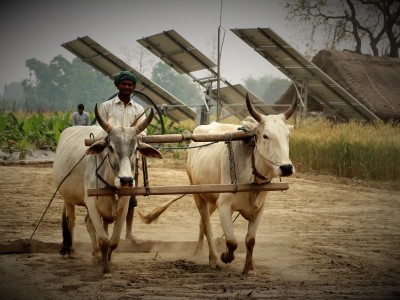Even as India continues to record impressive economic growth rates, poverty remains widespread and disparities deeply entrenched. Recently, the Government of India estimates suggest 37 percent of the population lives below the poverty line.DEHAT works in partnership with civil society organizations and community based organizations to enhance the effectiveness of national poverty reduction and livelihood programmes, and to build partnerships that enable disadvantaged communities to improve skills and diversify agriculture and non-agricultural activities. We believe that each family in the state should be out of poverty and enjoy:
- Life with dignity
- Equity within the family
- Freedom from hunger
- Decent Income: Rs. 1 Lakh p.a, 3 – 4 sources
- Risks managed – life, health, assets and incomes
- Shelter, education, health and fulfillment of the basic rights of their children.
The Crisis
Out of an estimated number of 22.15 million rural households in Uttar Pradesh, 77.4% are farmer households. Data revealed by the National Sample Survey Organization based on 59th round of NSS says over 24% of UP farmers (27% at all India level) did not like farming and felt that agriculture was not profitable. 41% farmers in UP (40% at all India level) felt that, given a choice, they would take up some other career. This indicates a serious problem wherein the main sufferers is suffering from low self-esteem and does not believe that what he is doing is worthwhile economically or even socially. In the social hierarchy, farming as a profession now is seen as considerably low in the social order.
- Households with one hectare or less land accounted for 74% of all farmer households and about 39% of them were indebted.
- Agriculture growth rate has dropped from 4.8% to 2%. About 60% of the population depends on agriculture whereas the contribution of agriculture to the GDP is about 18%.
- About 75% of the families are marginal with average land holding of up to 0.5 acres. And about 25% are landless families, who only depend on agriculture-based wage work; some of them take land on a lease/sharing basis for crop purposes.
- With personal land and agriculture-based wage work combined, farmers are still only able to live off of their produce profits for 4 -5 months.
- Meanwhile, the wage availability in agriculture is very limited. The current norm is less than 100 days of employment at Rs.80-100 for men and Rs.50-80 for women. High populations and small land holdings further aggravate the situation. Also, mechanization of agriculture work has adversely affected the wage employment status of the area.
- The farmers we work with do not have access to mainstream markets, and thus will be forced to sell their products at much lower rates
- Even in areas where 56% of the population is literate, there is only a 7% employment rate due to barriers in accessing potential employers.
Here DEHAT puts forward the following initiatives:
The “Swavalamban” Initiative
The aim of "Swavlamban" is to improve the livelihoods of farmers and their families through progressive farming that...
Donate NowImpact so far
- Farmers gained over more than 50 lakh in profits from new farming practices.
- Vermi composting has saved farmers 80% of expenses on chemical fertilizers.
- 246 farms are in process for registration with the 30P government assistance programme.
- All farmers in the initiative have adopted rooftop vegetable cultivation at their homes.
- More than 10000 “subabul” trees and above 20,000 bamboo trees have been planted for use as construction material and cattle fodder.
- More than 1000 youths trained are sending crores of rupees to their homes and restoring their child and family rights.
- The placement rate of 87% allows our graduates put their new skills to use immediately after leaving the Skill Development Centre. With monthly salaries of Rs.6, 000 and above, students who find employment this way can expand their self-reliance, as well as contribute to their families who are often otherwise stuck in harsh poverty.

